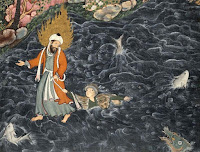Meeting Khizr, our own the evergreen Master

There is no final station and if there is, it is the station of no-station. Khizr, has been a perennially sought presence across cultures. Who is he and is he around or is there Khizr within or in every other person if we are attentive enough? Is he alive or dead? Why was Moses asked to be his student? Despite such ever debated questions that have occupied/divided scholars, meeting him is generally considered a privilege though it is also said that few recognize him when this happens. He is around but we are heedless. In many subtle ways, we might have experienced his kind presence and help. So much confusion around him reigns because good works on him are not available. Partly filling the gap for Urdu reading world is Dr. G. Q. Lone’s Hazrat Khizr: Tehqeek ki Roshni Mei ; lucid book that reviews and distills centuries of scholarship on the issue though one misses engagement with modern approaches, especially myth criticism, and certain aspects of traditional science of symbolis


